If you google Argentina’s currency controls you are hit by multiple headlines going back a long time. Here’s a cable from October 29, 2019, for example: “The Central Bank will restrict dollar purchases by savers to buy just 200 dollars per month compared with the 10,000 dollars per month previously, according to a statement.” That’s old news, right? You bet. Those were the restrictions put in place while Mauricio Macri, the leader of the centre-right coalition Juntos por el Cambio, was still the country’s outgoing president. The flood of content shows that Argentina’s exasperating affair with the dollar is a recurring issue.
Here’s the latest twist. Central Bank chief Miguel Pesce on Tuesday announced further foreign exchange market controls. The announcement came only days after Economy Minister Martín Guzmán said in a high-profile interview with a major daily that the US$200 cap would not be limited further. Pesce, in an interview with a cable television channel on Wednesday, was adamant that the new restrictions did not overrule the declarations by Guzmán, a US-trained economist who recently successfully restructured US$65-billion worth of Argentina’s foreign debt. Technically the Central Bank governor was right. Pesce, a senior economic technocrat with a background in the many-times splintered centrist Radical Party, said the new controls had been discussed with the Economy Ministry. The news, which rattled public opinion in the middle of the coronavirus pandemic, came on the same day Guzmán submitted next year’s budget to Congress.
The tightening of the controls had been agitated by a wing of President Alberto Fernández’s administration which does not report to Guzmán (most notably Deputy Cabinet Chief Cecilia Todesca, another economist). Pesce on Wednesday sounded like he was convinced that the right decision had been taken. The president himself also quipped in public that Argentina needs its dollars for production, not stuffed in the population’s mattresses. The new measures include a 35 percent tax on dollar purchases by retail savers, which will apply on top of the previous 30 percent levy known as the solidarity tax. It will also affect credit card purchases in dollars, Bloomberg reported.
The immediate jitters about the state of Central Bank reserves were clearly evident, with a dollar going for 145 pesos on the black market on Wednesday. Pesce reminded the public that the black market is the illegal place where drug dealers and gun runners go for their greenbacks. He has a point, but the Central Bank chief should know that he lives in the land of euphemisms. The black market dollar has for a long time now been dubbed the “blue dollar” in Argentina. Out on the street nobody really considers it an illegal trade, which says a lot about what most citizens think about the law and how it applies to them.
Delve deeper into the measures and you will find that the Central Bank has also required companies with more than US$1 million in monthly debt payments through March to find a way to restructure those obligations. The decision came after some observers panicked about a wave of news reporting that some foreign private companies, such as the retailer Falabella, were pulling out of Argentina. Many of those reports, however, were not fully confirmed.
Shortly after winning the presidency in 2015, Macri audaciously scrapped the currency exchange controls introduced by his predecessor ( now the nation’s vice-president), Cristina Fernández de Kirchner. Macri was forced to introduce controls again as his market-friendly administration struggled to resuscitate the economy and amassed debt. The ultimate fear is that the restrictions are a desperate bid to stop the drain of Central Bank reserves and that a severe crisis, after the economic damage inflicted by the coronavirus pandemic, lies ahead for Argentina.
The political climate has been further agitated by Fernández’s decision to announce a cut in federal revenue allotted to Buenos Aires City, which is ruled by the opposition centre-right Mayor Horacio Rodríguez Larreta. Macri increased, by decree, the revenue awarded to Federal Capital when most of the Federal Police was transferred during his mandate. Now the Peronist administration is saying that it has a right to take the money back. The mayor, who has tried to avoid confrontation with the national government and has worked with it to tackle the coronavirus, says he will take his case to the Supreme Court and is seeking an injunction.
The money will instead be used to foot the bill for a salary increase for the Buenos Aires Province Police, according to the president. Last week, the provincial police staged a noisy mutiny to demand a pay increase last week. Buenos Aires Governor Axel Kicillof, who is close to Fernández de Kirchner, scrambled to deal with it to little avail. The mutiny is over and BA province officials now claim that most of the force is working normally, but rumours have continued to swirl about the possible resignation of BA province Security Minister Sergio Berni, a retired Army surgeon also loyal to the vice-president who preaches law and order.
Speculation is rife that the police mutiny was stoked by Peronist mayors loyal to the president who want Berni to quit. Was Berni – the man ironically nicknamed “Rambo” by the opposition – ambushed from forces within the ruling coalition? The controversial minister, who has flatly denied his resignation is on the way, has dared the mayors to criticise him in public. He has political ambitions and could run for Congress next year in the province, a key Kirchnerite bastion (especially Greater Buenos Aires). Bernie is so outspoken that he has now picked an argument with human rights groups, after calling them “lazy” for refusing to work with his officials. He has since apologised. But he has also argued bitterly with Horacio Verbitsky, a well-known journalist who said the security minister has mental problems.
The rampant dollar jitters are adding to the volatility. The government has been hit by a wave of defiant anti-government protests since the pandemic broke out in March. Macri has now “broken his silence” to imply in a newspaper article that the Peronist administration is deliberately working to destroy civil liberties and attack the Constitution. The opposition is even now challenging the legality of Senate sessions presided over by Fernández de Kirchner, where the ruling coalition enjoys a clear majority.
The challenges keep on coming. On Wednesday, the Senate voted against approving the transfer of three judges who were appointed by a Macri decree to new positions within the judicial system. The Peronist majority argued that the former president’s decision to move the judges to new positions by decree lacked the required approval from the upper house. But here’s the twist: the three judges are currently involved in the handling of corruption cases against Fernández de Kirchner. One judge has vowed to resist the Senate’s decision – here’s another case for the Supreme Court to sort out.






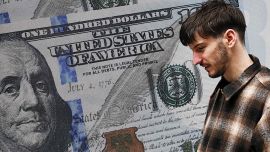



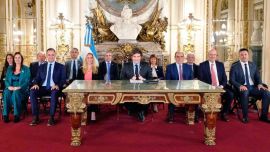
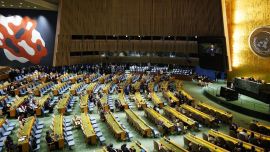
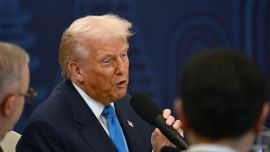
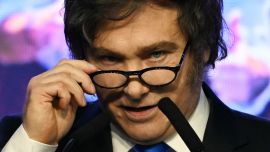
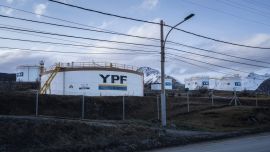
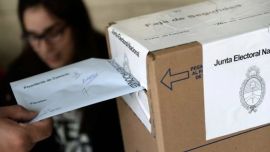
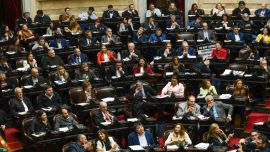
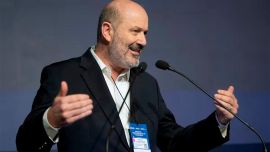
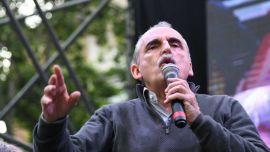

Comments